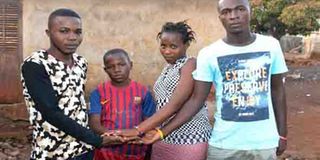Ebola orphans struggle to resume their lives

Orphan children (from L) Leno Emmanuel, Leno Ousmane Tamba, Leno Hawa and Leno Mathias, pose on January 12, 2016 at home in Conakry, Guinea (AFP)
What you need to know:
According to the United Nations, more than 22,000 children lost at least one parent to the deadliest Ebola outbreak in history whose epicentre lay in the west African countries of Guinea, Sierra Leone and Liberia.
Conakry (AFP). Saa Mathias Lenoh, a high school student in the Guinean capital Conakry, says he's "learning to smile little by little," like thousands of other youngsters orphaned by Ebola in west Africa.
According to the United Nations, more than 22,000 children lost at least one parent to the deadliest Ebola outbreak in history whose epicentre lay in the west African countries of Guinea, Sierra Leone and Liberia.
"The children really suffered at the start. The moment one came to know of illness in the family, they were automatically stigmatised," said Yaya Diallo, an official with Plan International, a leading global NGO.
"The neighbours and even neighbourhood children who would play with them and went to school with them were forbidden by their parents to do so," he said.
"Their own parents in turn would virtually lock them up at home or send them to communities very far away so that they would not have to suffer," Diallo said.
The outbreak, which had its origins in Guinea, infected almost 29,000 people and claimed 11,315 lives, according to official data which most experts accept represents a significant underestimate.
The World Health Organization will on Thursday declare an official end to this outbreak.
It initially led to a knee-jerk reaction from locals, and children from affected families often bore the brunt of ignorance and prejudice.
In one particularly horrific case in neighbouring Liberia, 12-year-old Fatu Sherrif was locked into her home with her dead mother in the quarantined hamlet of Ballajah, 150 kilometres (90 miles) from the capital Monrovia, as panicked neighbours fled to the forest.
Her cries could be heard for several days by the few who had stayed in the abandoned village before she died alone, without food or water.
International organisations deplored the lack of traditional solidarity to those affected this time round in contrast to earlier times, such as when AIDS had ravaged the continent.
But since then, nearly all those children have been taken in by foster families or are in care, the UN childrens' agency UNICEF noted.




